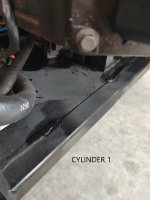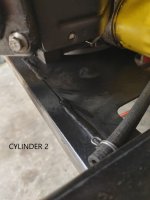Turbodriven
Active Member
- Joined
- Aug 18, 2023
- Threads
- 11
- Messages
- 84
I've taken the exhaust off a few times now. It's not hard. It'll be loud but I'll try running it without to see what happens. Previously I blew through each exhaust port with (sealed) compressed air. #1 wasn't "holding pressure" different than #2 or anything but the testing method did seem pretty un-scientific at the time because my compressor wasn't filling that whole muffler in any quick order.
The more I think about it "scientifically", the more I think that it's the only thing that makes sense really though. Assuming a carbon fouled #1 isn't just some inherent design issue with this motor when you run it at low rpms under load for 5-10min (because the motor is being held back from some external issue).
If it's not a design issue, then we have to look at all the possible (generic) causes of carbon fouling on only 1 cylinder. It has to be one of three things. Too much fuel, too much oil, or not enough air. That's really all it could be.
1.We can eliminate too much fuel because the fuel/air atomizes at the single carb on this motor and gets put into both cylinders equally straight through the intake valves (both 1 and 2 intake valves were tested and they operate the same). If it was a too much fuel issue it would affect both cylinders.
2. It can't be oil because the leakdown test was passing, I'm not burning large amounts of oil, the head gaskets are new, and the valve seals were holding back gas (and therefore oil from the heads too) when I tested the valves. So there is nowhere for the oil to come from. Granted some oil is probably leaking past average condition rings, but not just on cylinder 1. That would be happening on both 1 and 2.
3. Literally the only thing (in my mind) that this could be, is that on the exhaust stroke, not all the un-burnt fuel on #1 is being allowed to exit. Creating a rich condition on the next intake stroke. And we know that the exhaust valve opens the same as #2 (again, checked cold). So this problem wouldn't be at the cylinder head given that evidence.
It's possible that when the motor gets hot the valves are acting differently for some reason. Or maybe the hydraulic lifters are not operating properly under load? It seemed to have fresh oil when I bought it so I didn't do an oil change. Perhaps I should. I know oil viscosity affects how hydraulic lifters perform (although I'm not an expert on hydraulic lifters either). That said, improper oil would affect all the lifters equally. So it sort of rules itself out.
Sorry for the long post, it's mostly me putting my thoughts on paper. I'll check the exhaust and report back. Thank you for all your help so far!
The more I think about it "scientifically", the more I think that it's the only thing that makes sense really though. Assuming a carbon fouled #1 isn't just some inherent design issue with this motor when you run it at low rpms under load for 5-10min (because the motor is being held back from some external issue).
If it's not a design issue, then we have to look at all the possible (generic) causes of carbon fouling on only 1 cylinder. It has to be one of three things. Too much fuel, too much oil, or not enough air. That's really all it could be.
1.We can eliminate too much fuel because the fuel/air atomizes at the single carb on this motor and gets put into both cylinders equally straight through the intake valves (both 1 and 2 intake valves were tested and they operate the same). If it was a too much fuel issue it would affect both cylinders.
2. It can't be oil because the leakdown test was passing, I'm not burning large amounts of oil, the head gaskets are new, and the valve seals were holding back gas (and therefore oil from the heads too) when I tested the valves. So there is nowhere for the oil to come from. Granted some oil is probably leaking past average condition rings, but not just on cylinder 1. That would be happening on both 1 and 2.
3. Literally the only thing (in my mind) that this could be, is that on the exhaust stroke, not all the un-burnt fuel on #1 is being allowed to exit. Creating a rich condition on the next intake stroke. And we know that the exhaust valve opens the same as #2 (again, checked cold). So this problem wouldn't be at the cylinder head given that evidence.
It's possible that when the motor gets hot the valves are acting differently for some reason. Or maybe the hydraulic lifters are not operating properly under load? It seemed to have fresh oil when I bought it so I didn't do an oil change. Perhaps I should. I know oil viscosity affects how hydraulic lifters perform (although I'm not an expert on hydraulic lifters either). That said, improper oil would affect all the lifters equally. So it sort of rules itself out.
Sorry for the long post, it's mostly me putting my thoughts on paper. I'll check the exhaust and report back. Thank you for all your help so far!



